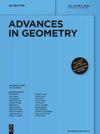Variations on the Weak Bounded Negativity Conjecture
IF 0.5
4区 数学
Q3 MATHEMATICS
引用次数: 0
Abstract
We present two applications of Hao’s proof of the弱边界否定性猜想的变体
我们介绍了郝氏对弱有界否定猜想证明的两个应用。首先,我们讨论了所谓的加权有界否定猜想,并证明了在ℙ2的炸开上,除了有限多的还原曲线和不可还原曲线C之外,所有在n个点上的还原曲线和不可还原曲线C都满足不等式 $\begin{array}{}\displaystyle C^2 \ge \min \bigl\{-\frac{1}{12} n (C.L +27), -2 \bigr\}, \end{array}$ 其中 L 是直线的回拉。接下来,我们将讨论一个广为流传的猜想,即光滑投影面 X 上积分曲线的规范度 C.KX 是由 A(g - 1) + B 形式的表达式从上而下限定的,其中 g 是 C 的几何属,A、B 是仅取决于 X 的常数。
本文章由计算机程序翻译,如有差异,请以英文原文为准。
求助全文
约1分钟内获得全文
求助全文
来源期刊

Advances in Geometry
数学-数学
CiteScore
1.00
自引率
0.00%
发文量
31
审稿时长
>12 weeks
期刊介绍:
Advances in Geometry is a mathematical journal for the publication of original research articles of excellent quality in the area of geometry. Geometry is a field of long standing-tradition and eminent importance. The study of space and spatial patterns is a major mathematical activity; geometric ideas and geometric language permeate all of mathematics.
 求助内容:
求助内容: 应助结果提醒方式:
应助结果提醒方式:


